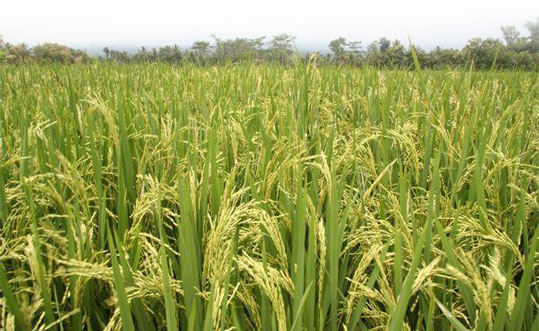Kuwaiti Farmer grow the Basmati Rice in Kuwait
 A Kuwaiti farmer has managed to grow basmati rice in Kuwait for the first time. Yusuf Al-Kirbani told KUNA, Kuwait News Agency, that despite tough conditions he has grown Indian basmati rice on his farm in the Al Wafra area.
A Kuwaiti farmer has managed to grow basmati rice in Kuwait for the first time. Yusuf Al-Kirbani told KUNA, Kuwait News Agency, that despite tough conditions he has grown Indian basmati rice on his farm in the Al Wafra area.
He said basmati requires heavy neutral soils like clay, clay loam and loamy, that are capable of holding water for longer periods, So he used cultivation basins without holes to hold water. He also attempted to produce black tomatoes and white strawberry.
*Basmati is a variety of long, slender grain aromatic rice which is traditionally from India and Pakistan. In 2014, India supplied 65 percent of the overseas basmati rice market. ‘Basmati’ derives from the Sanskrit word vasmati, meaning ‘fragrant’. It is believed to have been cultivated in the Indian subcontinent for centuries.
Kuwait News
- Events in Kuwait
- 6,127 expats terminated; 1,840 more to be terminated
- 7 yrs imprisonment with 2,710,000 dinars fine plus deportation for Bangladeshi
- Filipino arrested with 10 kg of drugs brought in from Pakistan
- Kuwait sent oxygen cylinders to India
- A vaccination certificate will be mandatory
- Kuwait suspends commercial flights from India
- Direct flights, from and to Kuwait
- Kuwait ready for reopening of schools
- Kuwaiti woman slain in public
- Above 65 can get COVID-19 vaccine without prior appointment
- Unpaid expat gets cash exceeding his one year salary
- The reason behind spread of coronavirus in Kuwait
- Philippines officially lifts ban on sending domestic workers to Kuwait
- Expats (non-vaccinated) have higher ICU numbers in Kuwait
- Rich became richer in the COVID pandemic
- Twitter, Facebook, WhatsApp, YouTube and Telegram blocked till 3pm – Pakistan
- GCC coronavirus cases – 15.04.2021
- List of accredited laboratories for Pakistan and the Philippines
- Kuwait issued an order to extend the period for residency violators
- It is time to leave Afghanistan

Comments (1)
Filed in: All • Expats in Kuwait • Info • Local News • News









Very interesting how technology makes it possible to grow rice in such hard climate conditions